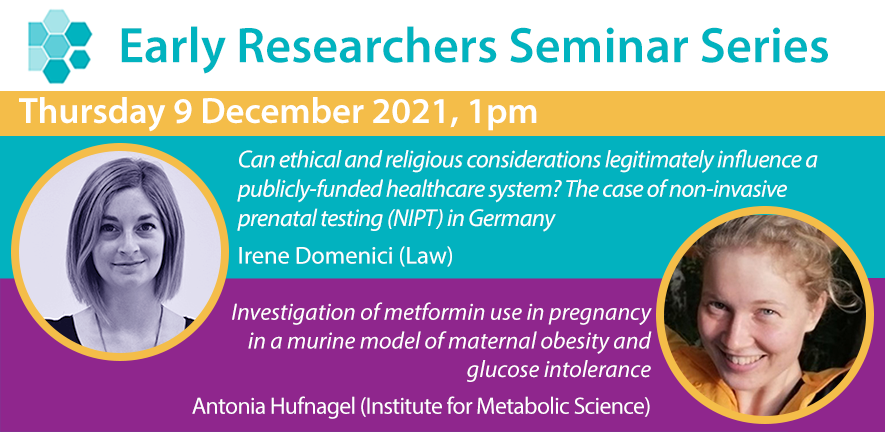
Thursday 9 December 2021, 1pm - 2pm*
Can ethical and religious considerations legitimately influence a publicly-funded healthcare system? The case of non-invasive prenatal testing (NIPT) in Germany
Irene Domenici (Max Planck Law/Faculty of Law)
Investigation of metformin use in pregnancy in a murine model of maternal obesity and glucose intolerance
Antonia Hufnagel (Institute of Metabolic Science)
Chair: Dr Staci Meredith Weiss (Psychology)
Meeting link
The Zoom meeting details can be found on this page (Cam only; Raven login needed): https://www.repro.cam.ac.uk/erss-2021-22-zoom-meeting-details. If you don't have a Raven login, please email Christina Rozeik to receive the Zoom meeting link for this year's seminars.
* Please note that the December seminar is on the second, not third, Thursday of the month.
Speakers and abstracts
Can ethical and religious considerations legitimately influence a publicly-funded healthcare system? The case of non-invasive prenatal testing (NIPT) in Germany
Irene Domenici (Max Planck Law/Faculty of Law)
In public healthcare systems, decision-makers enjoy a wide margin of discretion in deciding which healthcare services are offered free of charge. This carries the risk that decisions may be guided by particular ethical convictions, thus allowing ideological opposition to a technology to materialise in the refusal to finance it. However, in societies characterised by ethical pluralism, it is imperative that the state ensures its actions are justified by reasons acceptable to society as a whole.
To illustrate these considerations, I use the case of NIPT in Germany. While prenatal screening for trisomies is routinely offered, the ‘paradigm shift’ brought about by NIPT has led to reconsidering its ethical implications. Considering the criteria guiding the inclusion of new technologies in the German statutory health insurance, NIPT seems an excellent candidate to become part of pregnancy care. Compared to invasive procedures, NIPT is cheaper and safer. Yet, objections to its public funding are raised on grounds of ethical and religious considerations.
About Irene Domenici: I am a PhD student at the Max Planck Institute for Social Law and Social Policy in Munich (Germany) and currently an academic visitor to the Faculty of Law, University of Cambridge. My research interests focus on comparative health care law and constitutional law. My dissertation investigates the reimbursement of ethically controversial reproductive technologies in publicly funded health care systems. After obtaining my Master's degree in Law at the University of Trento (Italy), I worked as an intern at the Bioethics Committee of the Council of Europe and I have been passionate about the regulation of reproductive technologies ever since.
Investigation of metformin use in pregnancy in a murine model of maternal obesity and glucose intolerance
Antonia Hufnagel (Institute of Metabolic Science)
More than 50% of women enter pregnancy overweight or obese worldwide, and this is thought to contribute to recent increases in the prevalence of gestational diabetes. It is well-known that gestational diabetes has short- and long-term detrimental consequences for mother and baby and therefore women with gestational diabetes are treated to control glycaemia. Metformin, an oral glucose-lowering agent, is the first line pharmacological treatment for gestational diabetes in many countries, including the UK. However, metformin freely crosses the placenta and hence has the potential to have direct effects on the placenta and fetus. We therefore assessed the use of metformin in pregnancy in a mouse (C57Bl6/J) model of diet-induced obesity and glucose intolerance. Metformin was given at clinically relevant doses one week prior to and during pregnancy. Obese animals had increased fat mass, impaired glucose tolerance, and reduced uterine artery compliance at the end of pregnancy (E18.5). Metformin treatment improved all these parameters. Maternal obesity caused placental calcification and a reduction of the placental labyrinthine. Consistent with these changes in the placenta, the fetuses of obese mothers were smaller than control fetuses at E18.5. Despite improvements in maternal metabolism and uterine artery function, metformin did not prevent the effects of maternal obesity on fetal growth or the placenta. Metformin entered the placenta and the fetal circulation at levels equivalent to those in the maternal circulation. These findings identify the need to further define the direct effects of metformin on the fetus that could potentially impact on long-term health.
Antonia Hufnagel is a PhD student in the lab of Prof. Susan Ozanne at the Institute of Metabolic Science, Cambridge. She obtained her BSc degree in Molecular Medicine from the Albert-Ludwigs-Universität in Freiburg and completed her MRes degree at the University of Cambridge.
The Early Researchers Seminar Series (ERSS) is a platform for PhD Students and early career researchers (ECRs) at the University of Cambridge with research foci on reproduction to share and discuss their research with other academics from a range of disciplines also researching reproduction at the University. Seminars are held on Zoom on the thirdThursday of every month, 1pm - 2pm. For more information, and for the full 2021 - 2022 programme, please see the main ERSS page.



